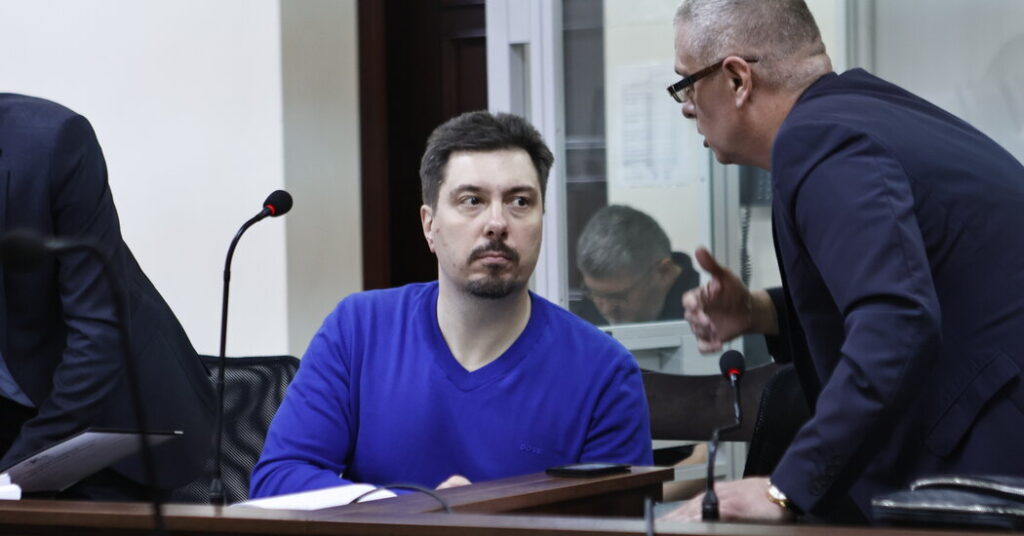The chief of Ukraine’s Supreme Court was formally arrested Thursday, as prosecutors indicated in a second day of hearings that a high-level corruption case was expanding to include a wider circle of judges.
Prosecutors also accused a lawyer of acting as an intermediary in paying a bribe to the chief justice, and said that at least three other judges of the court had been found holding thousands of dollars in currency marked by investigators.
The chief justice, Vsevolod Knyazev, was apprehended just after midnight Tuesday by officers of the National Anti-corruption Bureau of Ukraine, who searched his home and office in simultaneous raids and said they found large sums of cash in U.S. currency.
In videos of court hearings Wednesday and Thursday, posted on the High Anti-Corruption Court’s YouTube channel, Mr. Knyazev appeared in the courtroom wearing a bright blue sweater and flanked by his lawyers. The High Council of Justice Council on Thursday lifted his immunity from prosecution, opening the way for his formal arrest.
Mr. Knyazev has been charged with graft in a public office, and accused of accepting a bribe of $1.8 million to influence a case in favor of a Ukrainian oligarch, Kostyantyn Zhevago. A prosecutor said Mr. Knyazev had sent a message to the lawyer in early May to split the money into at least 14 separate bags, and later sent a message saying he had passed the money to other judges.
The Anti-Corruption Court’s prosecutor, Oleksandr Omelchenko, told the court that officers had tracked the payment of the first tranche of the bribe on May 3, and raided Mr. Knyazev’s home half an hour after a second tranche was handed over on Monday evening.
The anti-corruption bureau had infiltrated the group making the bribe and marked the notes used in the payment. Officers discovered $1.8 million in cash at Mr. Knyazev’s home and office, but the prosecutor said that not all the bribe money, totaling $2.7 million, had been recovered.
Mr. Zhevago, currently in France, has been fighting extradition to Ukraine, where he faced charges of embezzlement and money laundering in a separate case. He has denied involvement in the bribery case.
Oleh Horestkyi, the lawyer acting for the oligarch, was apprehended with Mr. Knyazev in the act of handing over part of the bribe on Tuesday. He was detained for 60 days by the court, the special anti-corruption prosecutor said in a statement.
The case has shocked and dismayed members of Ukraine’s judiciary. Two Supreme Court judges in interviews lamented the damage to the reputation of the court and the judiciary. They said they worked through the night and most of Tuesday to prepare a ballot in which 140 of the 142 Supreme Court judges voted to remove Mr. Knyazev from his post. The two judges spoke on condition of anonymity, because of their position as members of the court.
With continued Western aid as well as eventual membership in the European Union and NATO at stake, President Volodymyr Zelensky has made a show of cracking down on Ukraine’s endemic corruption. In January, numerous officials were dismissed, including a deputy minister in the presidential office who was accused of participating in a $400,000 bribe.
But members of anti-corruption organizations welcomed the investigation as a sign that Ukraine’s anti-corruption law enforcement was proving its resilience even during a war.
“I am happy that this happened because it shows that these institutions are independent and they can bring anybody to justice,” said Andriy Borovyk, executive director of Transparency International Ukraine.
The Supreme Court judges’ swift removal of Mr. Knyazev was also a sign of accountability, said Vitalii Shabunin, director of the board of the Anti-Corruption Action Center, a nonprofit.
“The good news is that the institution by itself is ready to resolve the problem,” he said.
The bureau said in a statement that the bribe was made on behalf of Mr. Zhevago in a dispute over the ownership of 40 percent of the shares of the Poltava Mining and Processing Plant, Ferrexpo. The court decided the case in the oligarch’s favor in April 2023, it said.
Mr. Shabunin said that the prosecution of such a high-level case was proof that the anti-corruption institutions established since Ukraine’s “revolution of dignity” in 2014 were working properly. Recent appointments to the bodies had been conducted fairly and transparently, he said.
But he said other institutions were dragging their feet. In particular, he said, Ukraine’s Parliament should reinstate the system of declaration of assets by public officials, as the International Monetary Fund has demanded. The law was suspended last year after Russia invaded.
The government of Mr. Zelensky, who was elected in 2019 on promises to curb corruption, has had some success but also setbacks, Mr. Borovyk said.
“During Zelensky we were always one step forward, one step back,” he said. “In general there were good times and not so good times.”
But he said leaders are feeling strong pressure from Ukrainian citizens, who have ranked the fight against corruption as second in importance only to bringing Russia to justice for the war.
Oleksandr Chubko and Dyma Shapoval contributed reporting from Kyiv.


